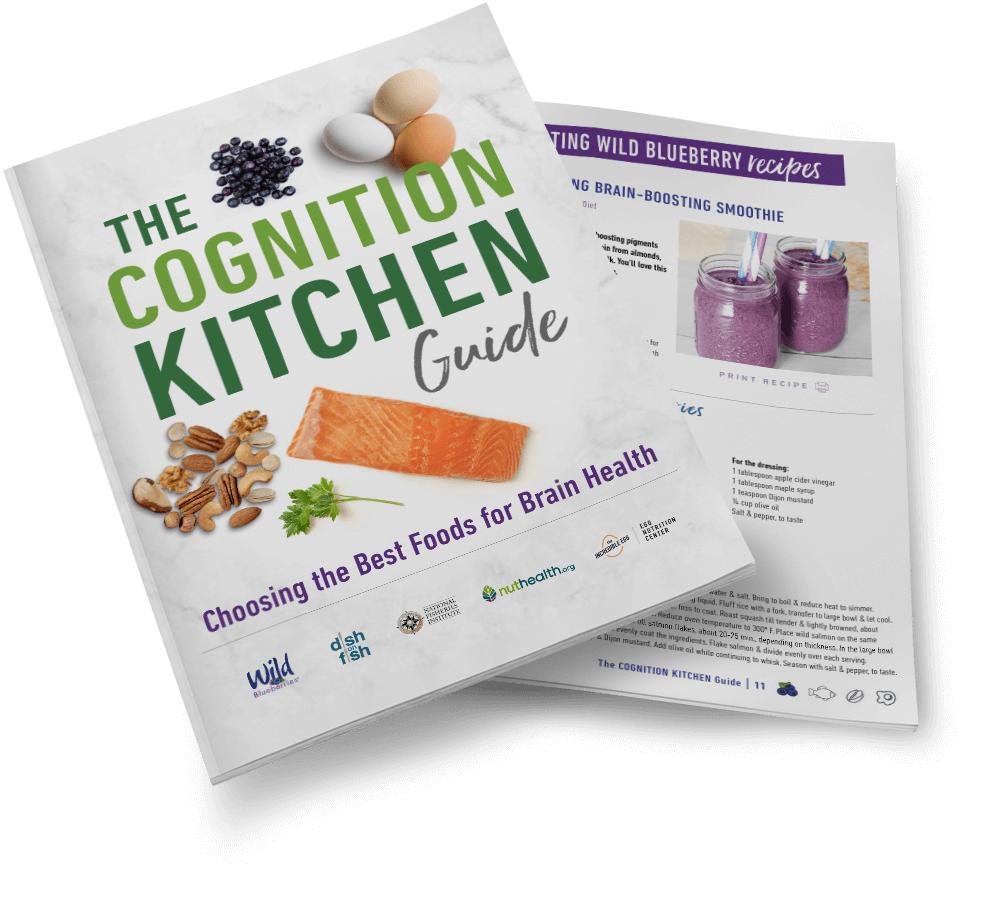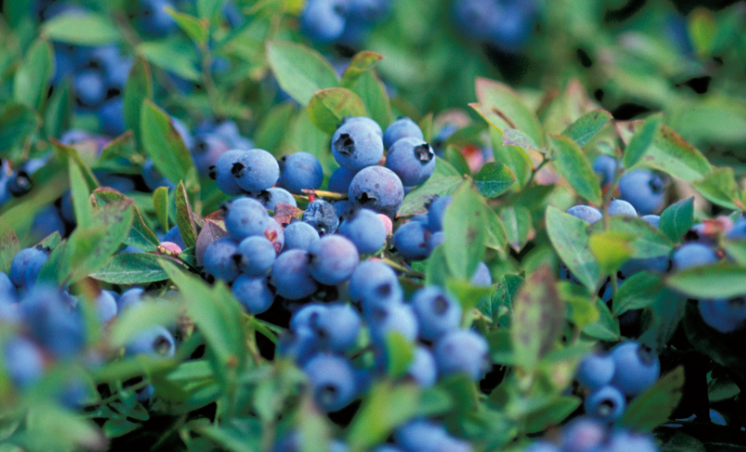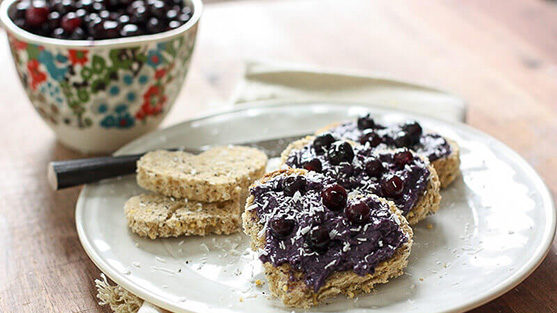Do Wild Blueberries Improve Memory?
Everyone forgets things sometimes—where we left our car in a large parking lot, a friend’s birthday, or an appointment we need to make. And it’s no wonder! Our brains are complex and busy working all the time to support our ever more complicated lives. People can experience forgetfulness at any age. Typically however, issues with chronic forgetfulness and memory loss become more common with advancing age.
Eating to support healthy brain development during childhood and to protect and support the brain’s cognitive function is important throughout life. In fact, there is a growing body of evidence that indicates that eating brain-healthy foods regularly can impact brain function. No one food can guarantee mental health of course, but brain-friendly foods such as fruit (including berries), vegetables, whole grains and nuts are recommended.

Different types of memory & the brain
The word “memories” tends to bring up fond recollections from childhood or special times in our lives, but there are actually several different types of memories that are stored in the brain.1
Memories are generally categorized as:
- Short-term memory, which allows us to keep a small bit of information (such as a phone number or name) at-hand in our brains for seconds to minutes of time.
- Working memory, which is related to or overlapping with short-term memory goes further than simple temporary storage. Working memory refers to the ability of the brain to retain information specifically to manipulate it and use it for cognitive tasks such as planning, reasoning, and problem-solving. Performing complex tasks or multiple simultaneous tasks utilizes working memory.2
- Long-term memory, which is stored in our brain’s neural network and retrieved for years.1
What causes memory problems?
From middle age onward, adults are subject to a decline in their ‘cognitive agility’ that over time can impact processing speed, memory, and executive function. It’s believed that this decline is related to the brain’s vulnerability to oxidative stress and inflammation and their long-term effects.3
Aside from normal aging, other causes of memory problems can include medical conditions, emotional issues, mild cognitive impairment or other types of dementia.
Studies of memory usually test several types of memory, and researchers employ a variety of standardized tests in order to assess changes. to examine a certain type of memory and to assess changes due a nutrition treatment.
Berries & the brain
Epidemiological (population-based) studies using decades of data have found that regular consumption of particular fruit and vegetable components can reduce one’s risk of cognitive decline. Evidence for other beneficial effects of certain plant food components on brain function continues to be reported from human clinical trials and preclinical work investigations.
Berries, including wild blueberries, are frequently selected by researchers who work in the area of brain health and nutrition due to the already compelling body of research indicating that berries are a neuroprotective food that can benefit cognition.
Berries contain a range of different natural plant compounds, including a large group called flavonoids. Population studies have examined the effect of flavonoid intake on decline in cognitive function during aging. Research with a large cohort of females who were followed up for 26 years, concluded that higher total flavonoid consumption was associated with significantly slower rates of cognitive decline.4
And of the 31 flavonoids included in the study, anthocyanins seemed to have the highest association with cognitive benefits. (The predominant flavonoids from tea, onions, apples and oranges were not associated with delaying cognitive decline in this study.) Interestingly, anthocyanins can actually be detected in tissues of the brain.5
Among the different types of flavonoids, berries are often richest in anthocyanins. Anthocyanins are the pigments that give berries their vibrant purple, blue and red colors. Long term observational analyses of large populations suggest that anthocyanins provide health benefits over and above those conferred by other flavonoids.6 Blueberries contain abundant anthocyanins. In particular, wild blueberries are an excellent source of anthocyanins, boasting 33% more anthocyanins than regular blueberries—and a greater variety of them as well.
Wild blueberries & memory
Scientific evidence published over the last 20+ years suggests that eating wild blueberries regularly can be an effective way to enhance some aspects of brain function and maintain others. The impact of flavonoids on cognitive outcomes may depend on age.7
Blueberries and memory in adults
In general, clinical studies to date indicate that the consumption of blueberries and wild blueberries can improve brain performance in the areas of memory and executive function in adults.6
A preliminary study found a significant improvement in two different standardized memory tests after participants consumed wild blueberry juice daily for 12 weeks. These encouraging results prompted additional studies looking further into the link between blueberries and memory. 8
In a study of adults aged 65-80 of all ethnicities, with subjective self-reported memory complaints (but no diagnosed neurological conditions), researchers observed that daily wild blueberry consumption (in powder or extract) over 3 months improved episodic memory performance on a word recall task.
According to the researchers, the improvements in the word recall task is in keeping with results from other blueberry studies. In fact, this research lab had previously found that word recognition seems especially sensitive to anthocyanin-rich berry interventions among older adults. 9
Performance on both memory and executive function tasks were found to improve in people aged 60-75 when blueberry powder (equal to about 1 cup berries per day) was added to their daily diet for 90 days. 10
Another study showed modest beneficial impacts on memory among adults with early, subjective cognitive complaints when blueberry powder was added to the diet for 24 weeks. Improved discrimination in memory was also found in this study, indicating that subjects were better able to resist interference from non-related information during the test. 11
Blueberries and memory in children and teens
Several research studies with children have focused on testing their ability to memorize lists of words.
One study of children aged 8-10 showed that the children performed better on a word recall test just 2 hours after drinking one wild blueberry beverage, compared to a placebo beverage.12 In a similar study, headed by the same researcher, the cognitive performance of 7–10-year olds was examined at multiple time points after they had consumed either a wild blueberry test beverage or a placebo drink. The results indicated that wild blueberry benefits can last longer than a couple of hours. 13
References:
- Queensland Brain Institute, University of Queensland. Types of Memory. https://qbi.uq.edu.au/brain-basics/memory/types-memory
- Cowan N. (2014). Working memory underpins cognitive development, learning, and education. Educational Psychology Review, 26(2), 197–223. Working Memory Underpins Cognitive Development, Learning, and Education,
- Deary I.J., Corley J., Gow A.J., Harris S.E., Houlihan L.M., Marioni R.E., Penke L., Rafnsson S.B., Starr J.M. (2009) Age-associated cognitive decline. British Medical Bulletin 92:135-52. https://pubmed.ncbi.nlm.nih.gov/19776035/
- Devore, E.E., Kang, J.H., Breteler, M.M.B., Grodstein, F. (2012), Dietary intakes of berries and flavonoids in relation to cognitive decline. Annals of Neurology, 72: 135-143. https://onlinelibrary.wiley.com/doi/full/10.1002/ana.23594
- Milbury P.E., Kalt W. (2010) Xenobiotic metabolism and berry flavonoid transport across the blood-brain barrier. Journal of Agricultural and Food Chemistry 58(7):3950-6. doi: 10.1021/jf903529m. PMID: 20128604., https://pubmed.ncbi.nlm.nih.gov/20128604/
- Kalt, W., Cassidy, A., Howard, L., Krikorian, R., Stull, A., Tremblay, F., Zamora-Ros, R. (2020) Recent research on the health benefits of blueberries and their anthocyanins, Advances in Nutrition, Volume 11, Issue 2, March 2020, Pages 224–236, https://doi.org/10.1093/advances/nmz065
- Bell, L., Lamport, D. J., Butler, L. T., & Williams, C. M. (2015). A review of the cognitive effects observed in humans following acute supplementation with flavonoids, and their associated mechanisms of action. Nutrients, 7(12), 10290–10306. https://www.ncbi.nlm.nih.gov/pmc/articles/PMC4690090/
- Krikorian, R., Shidler, M. D., Nash, T. A., Kalt, W., Vinqvist-Tymchuk, M. R., Shukitt-Hale, B., & Joseph, J. A. (2010). Blueberry supplementation improves memory in older adults. Journal of Agricultural and Food Chemistry, 58(7), 3996–4000. https://doi.org/10.1021/jf9029332
- Whyte A.R., Cheng N., Fromentin E., Williams C.(2018) Randomized, double-blinded, placebo-controlled study to compare the safety and efficacy of low dose enhanced wild blueberry powder and wild blueberry extract (ThinkBlue™) in maintenance of episodic and working memory in older adults. Nutrients. 2018; 10(6):660. https://doi.org/10.3390/nu10060660
- Miller M.G., Hamilton D.A., Joseph J.A., Shukitt-Hale B. (2018) Dietary blueberry improves cognition among older adults in a randomized, double-blind, placebo-controlled trial. European Journal of Nutrition Apr;57(3):1169-1180. doi: 10.1007/s00394-017-1400-8. Epub 2017 Mar 10. PMID: 28283823., https://pubmed.ncbi.nlm.nih.gov/28283823/
- McNamara, R. K., Kalt, W., Shidler, M. D., McDonald, J., Summer, S. S., Stein, A. L., Stover, A. N., & Krikorian, R. (2018). Cognitive response to fish oil, blueberry, and combined supplementation in older adults with subjective cognitive impairment. Neurobiology of Aging, 64, 147–156. https://doi.org/10.1016/j.neurobiolaging.2017.12.003
- Whyte A.R., Williams C.M. (2015) Effects of a single dose of a flavonoid-rich blueberry drink on memory in 8 to 10 y old children. Nutrition Mar;31(3):531-4. doi: 10.1016/j.nut.2014.09.013. Epub 2014 Oct 18. PMID: 25701345., https://pubmed.ncbi.nlm.nih.gov/25701345/
- Whyte A.R., Schafer G., Williams C.M. (2016) Cognitive effects following acute wild blueberry supplementation in 7- to 10-year-old children. European Journal of Nutrition Sep;55(6):2151-62. doi: 19.1007/s00394-015-1029-4. Epub 2015 Oct 5. PMID: 26437830. https://pubmed.ncbi.nlm.nih.gov/26437830/
Get Great Recipes & More Each Month!
Sign up for occasional emails with recipes, health and nutrition tips, and more.

More About Brain Health
Blu-Flow study spotlights wild blueberries’ support of cardiovascular and cognitive function
New Research Study Indicates Wild Blueberries Improve Brain’s Processing Speed
A Healthy Heart Month “Two-fer” From Wild Blueberries
The Seven Wild Ways to a Healthy Brain in 2024
The Wild Difference: Celebrating Wild Foods Day All Month Long

DOWNLOAD THE COGNITION KITCHEN GUIDE
A free resource to help you and your family start eating for brain health today. Find recipes, a grocery list, easy-to-understand health research, and more.



